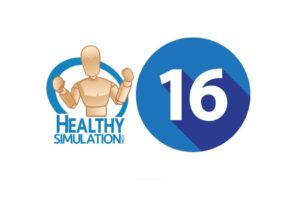Clinical Simulation Research Focus: Debriefing Literature Reviews 2023
The scientific support for healthcare simulation continues to grow and advance the science of clinical simulation. The incorporation of simulation research and evidence-based practice is imperative for the best outcomes for learners and simulationists. Healthcare Simulation Standards have been developed to guide simulation practice. Debriefing is often viewed as one of the most critical aspects of healthcare simulation and “where learning occurs.” According to the Healthcare Simulation Dictionary, one of the definitions is to conduct a session after a simulation event where educators/instructors/facilitators and learners re-examine the simulation experience for the purpose of moving toward assimilation and accommodation of learning to future situations. In other words, debriefing should foster the development of clinical judgment and critical thinking skills. This HealthySimulation.com article reviews published literature reviews on debriefing with the word debriefing in the title published between January 1 to September 1, 2023.
Arabi & Kennedy (2023). The Perceptions and Experiences of Undergraduate Healthcare Students With Debriefing Methods: A Systematized Review. Simulation in Healthcare, 10-1097: We performed a systematized review examining the existing literature on undergraduate healthcare students’ perceptions and experiences with debriefing methods in simulation-based education. Twenty empirical research articles published in English between 2008 and 2020 were identified during a systematic search of 4 electronic databases.
Data derived from these articles underwent critical appraisal and thematic analysis. Students valued the opportunity in debriefing for reflection, raising self-awareness of skills and learning. They preferred structured debriefing for promoting analytic skills and transfer of learning, favored video-assisted debriefing for fast recall and improving communication skills, and benefited most from instructor-led rather than peer-led debriefing. However, students appreciated group debriefing for aiding the construction of new understandings. There was no consensus on the preferred timing of debriefing, and students highlighted their concern about the disclosure of errors across different debriefing methods. Recommendations for educators to improve debriefing experiences and for future research are considered.
Sponsored Content:
Evans et al., (2023). A systematic scoping review on the evidence behind debriefing practices for the wellbeing/emotional outcomes of healthcare workers. Frontiers in psychiatry, 14, 1078797: Debriefings give healthcare workers voice through the opportunity to discuss unanticipated or difficult events and recommend changes. The typical goal of routine debriefings has been to improve clinical outcomes by learning through discussion and reflection of events and then transferring that learning into clinical practice. However, little research has investigated the effects of debriefings on the emotional experiences and well-being of healthcare workers.
There is some evidence that debriefings are a multi-faceted and cost-effective intervention for minimising negative health outcomes, but their use is inconsistent and they are infrequently adopted with the specific intention of giving healthcare workers a voice. The purpose of this systematic scoping review is therefore to assess the scope of existing evidence on debriefing practices for the well-being and emotional outcomes of healthcare workers. Following screening, 184 papers were synthesised through keyword mapping and exploratory trend identification. The body of evidence reviewed were clustered geographically, but diverse on many other criteria of interest including the types of evidence produced, debriefing models and practices, and outcomes captured. The current review provides a clear map of our existing understanding and highlights the need for more systematic, collaborative and rigorous bodies of evidence to determine the potential of debriefing to support the emotional outcomes of those working within healthcare.
Fegran et al., (2023). Simulation debriefing as part of simulation for clinical teaching and learning in nursing education: A scoping review. Nursing Open, 10(3): To map the evidence of the simulation debriefing phase in simulation activities of nursing education, to address and inform clinical teaching and learning in nursing. A scoping review design was used. A systematic review of literature published between 2008–2021 was conducted using CINAHL & ERIC, MEDLINE, EMBASE, APA PsycInfo, the Cochrane Library and JBI Evidence synthesis. Inclusion criteria were primary studies published in English on simulation debriefing at all levels in nursing education.
Of 140 included references, only 80% (N = 112) framed simulation debriefing theoretically either by specific theories/models or as a literature review of the topic. A variety of simulation debriefing methods were identified; however, debriefing methods were only described in 79% (N = 110) of the references. There appears to be a gap in consensus concerning the theoretical or methodological frameworks characterizing simulation debriefing in nursing education. The majority of studies (86%) were conducted at a bachelor’s degree level (N = 121).
Sponsored Content:
Kainth and Reedy (2023). Transforming Professional Identity in Simulation Debriefing: A Systematic Metaethnographic Synthesis of the Simulation Literature. Simulation in Healthcare, 10-1097: There continues to be a lack of detailed understanding of how debriefing works and how it enables learning. To further our understanding and simultaneously illuminate current knowledge, a metaethnographic qualitative synthesis was undertaken to address the research question: how are interactions in simulation debriefing related to participant learning? Ten databases were searched (up to November 2020) and 17 articles were selected for inclusion.
Initial interpretive synthesis generated 37 new concepts that were further synthesized to produce a new theoretical framework. At the heart of the framework is a concept of reflective work, where participants and faculty recontextualize the simulation experience bidirectionally with clinical reality: a process that facilitates sensemaking. This occurs in a learning milieu where activities such as storytelling, performance evaluation, perspective sharing, agenda setting, and video use are undertaken. The outcome is conceptualization of new future roles, clinical competence, and professional language development—a process of transforming professional identity.
Kainth & Reedy (2023). A systematic meta-ethnography of simulation debrief practice: A study protocol to investigate debrief interactions and the relationship to participant learning. International Journal of Healthcare Simulation, 1-11: Simulation-based education is now an established and curricula-integrated pedagogical activity in health professions education with the debriefing component seen to be critical to learning. There is limited empirical research examining the debrief activity, specifically addressing the question of how are interactions in simulation debriefing related to participant learning? The research that does exist is disparate, with researchers selecting different foci of interest, thus producing siloed knowledge. There is a need to both synthesise the current literature whilst simultaneously furthering the subject knowledge.
This is a protocol to undertake a systematic meta-ethnography in accordance with Noblit and Hare’s established methodology, consisting of seven phases. At the core of this approach is the process of reciprocal translation, where the key interpretations (termed ‘metaphors’) of included studies are juxtaposed with one another to enable new concepts to emerge. This protocol presents the first two phases, covering aspects of question formulation and search strategy utilising PICOS and STARLITE frameworks. We also present the protocol for the deeply interpretive analytical phases (four through six). We provide a comprehensive rationale for undertaking a meta-ethnography, and throughout emphasise the way we intend to navigate the tensions in a predominately positivist systematic review and deeply interpretive nature of a qualitative synthesis. We discuss the issue of quality appraisal in qualitative syntheses and present a modified framework which will function to enable contextual interpretation and bring a sense of collective rigor, and detail why quality appraisal should not be used to exclude articles. Lastly, we highlight the reflexive nature of a meta-ethnography where the final findings are imbued with the researchers’ identity.
Lorenzini et al., (2023). Emergency team competencies: scoping review for the development of a tool to support the briefing and debriefing activities of emergency healthcare providers. Journal of Anesthesia, Analgesia and Critical Care, 3(1), 24.: Globally, at least one adverse event occurs in 10% of patients using emergency, inpatient, outpatient, surgical and primary care services. Particularly in emergency health care, this problem is exacerbated by additional variables such as patient criticality, high-risk diagnostic and therapeutic interventions and varying levels of healthcare provider training. In relation to the last point, briefing and debriefing activities during an emergency reinforce staff training and support them in managing work resources, planning interventions and improving future performance. The aim of the scoping review is to explore the state of the art in human factors applied to emergency situations and to develop a new tool to support healthcare professionals in conducting evidence-based briefings and debriefings.
This review was developed using a search strategy based on the Arksey and O’Malley’s six-step framework for scoping reviews. The literature analysed and the data identified, which are heterogeneous due to different study methodologies, objectives and types of interventions, suggest that human factors applied to emergency situations are still under-researched. At the end of the data extraction, analysis process, authors’ reviews, discussion rounds and comparison with the multidisciplinary team of healthcare providers, 42 behaviours, 33 elements and 8 domains were considered relevant and included in the Emergency Team Comptencies (ETC) briefing and debriefing tool, ranked in order of priority as follows: communication, decision-making, clinical skills, situational awareness, leadership, task management, collaboration and stress and fatigue management. Further research is needed to investigate human factors applied to emergency situations and to generate new evidence to improve clinical practice and reduce the risk of error. In the near future, further studies will be conducted by the authors to test the validity of the Emergency Team Competencies tool in objectively measuring the performance of professionals and multidisciplinary teams.
View the HealthySimulation.com LEARN CE/CME Platform Webinar Healthcare Simulation Debriefing Strategies & Courses from Top Experts at The Debriefing Academy to learn more!
Mosher et al., (2023). Factors of engagement in synchronous online learning conversations and distance debriefing: A realist synthesis review. Simulation in Healthcare, 18(2), 126-134.: The COVID-19 pandemic propelled remote simulation and online distance debriefings. Like in-person debriefings, faculty seek to facilitate effective reflective discourse. The online learning environment, however, presents challenges to learner engagement that differ considerably from in-person debriefing, yet little research exists in this area. In an effort to identify factors that influence debriefing engagement in the online environment, we conceptualized distance debriefings as complex social interactions and performed a realist review of the literature for evidence in the fields of online learning, healthcare simulation, instructional design, and other teaching and learning fields to see whether we might discern factors that influence engagement in online learning conversations that might inform online distance debriefing best practices.
Eighteen articles were found through our search of 5 online databases (MEDLINE, CINAHL, ERIC, Google Scholar). We conducted iterative purposeful searching and continued to do so throughout the review to try to identify any additional studies that would contribute to our understanding. A thematic analysis of the findings of our included articles revealed indicators categorized using the community of inquiry framework, enabling us to understand and explain them in the context of online learning and propose their application to distance debriefing engagement. We also propose a new dimension to the framework: internal and external factors of engagement. Our findings demonstrate that online learning can positively influence engagement of learners if essential factors are implemented. These factors may inform recommendations for best practices toward learner engagement during healthcare simulation distance debriefing.
To remain current in best healthcare simulation practices, simulationists must read and evaluate the literature and research published. This clinical simulation literature review on debriefing research is the first in a series to focus on published research in healthcare simulation for 2023.
Teresa Gore, PhD, DNP, APRN, FNP-BC, CHSE-A, FSSH, FAAN – Dr. Gore has experience in educating future nurses in the undergraduate and graduate nursing programs. Dr. Gore has a PhD in Adult Education, a DNP as a family nurse practitioner, and a certificate in Simulation Education. Dr. Gore is an innovative, compassionate educator and an expert in the field of healthcare simulation. In 2007l Teresa started her journey in healthcare simulation. She is involved in INACSL and SSH. She is a Past-President of INACSL and is a Certified Healthcare Simulation Educator Advanced (CHSE-A). In 2018, she was inducted as a Fellow in the American Academy of Nursing (FAAN). In 2021, she was inducted as a Fellow in the Society of Simulation in Healthcare Academy (FSSH) and selected as a Visionary Leader University of Alabama at Birmingham School of Nursing Alumni. During her career, Dr. Gore has led in the development and integration of simulation into all undergraduate clinical courses and started an OSCE program for APRN students. Her research interests and scholarly work focus on simulation, online course development and faculty development. She has numerous invited presentations nationally and internationally on simulation topics.
Sponsored Content:


















